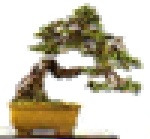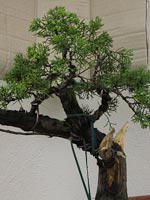Hawthorn backbudding
+6
Tentakelaertje
rrubberbandman
Zach Smith
M. Frary
JimLewis
George R
10 posters
Page 1 of 1
 Hawthorn backbudding
Hawthorn backbudding
Hello everyone!
This year,on the first of may,I've collected a hawthorn. On just one month it budded lavishly,putting up to 3 full twigs.
Two weeks ago the pot it was into was accidentally knocked down and broke. I've transplanted it into another pot,and after giving some new leaves,the branches all died back to the trunk. How can I get it to backbudd again?
This year,on the first of may,I've collected a hawthorn. On just one month it budded lavishly,putting up to 3 full twigs.
Two weeks ago the pot it was into was accidentally knocked down and broke. I've transplanted it into another pot,and after giving some new leaves,the branches all died back to the trunk. How can I get it to backbudd again?
George R- Member
 Re: Hawthorn backbudding
Re: Hawthorn backbudding
The tree is plain,just a stick going up ,with a diameter of 3 to 4 cm,but at the base it has a beautifull hollow.
George R- Member
 Re: Hawthorn backbudding
Re: Hawthorn backbudding
How long was the plant out of its pot? The roots may have dried and if it was just newly potted, there may not have been enough reserves in roots and trunks for survival. All I can suggest is to water moderately, fertilize, and give it part sun. And hope.

JimLewis- Member
 Re: Hawthorn backbudding
Re: Hawthorn backbudding
No longer than 10 to 20 minutes. I was the one that knocked it down. It was out only the time needed to change the pot. I've moved it to a place in same shade,and I keep the soil moist. I'm using natural fertilizer composed from sheep dung,limestone to counter the accidity from the soil,and a bit of charcoil for the pests. It's something we use for our vineyard.
George R- Member
 Re: Hawthorn backbudding
Re: Hawthorn backbudding
Doesn't sound good. It sounds like it was pretty stressed from collection if it only put out three branches. And if they died they were probably the only thing sustaining it. Only 10 to 20 minutes? Did you keep the roots moist during that time? I
M. Frary- Member
 Re: Hawthorn backbudding
Re: Hawthorn backbudding
Not sure how the hawthorns on the continent grow, but over here they usually don't root all that vigorously. So there's a good chance your new roots were irreparably damaged in the accident. I had something similar happen a few years ago. Where I am, collected hawthorns need a good solid undisturbed year to re-establish their root system.George R wrote:Hello everyone!
This year,on the first of may,I've collected a hawthorn. On just one month it budded lavishly,putting up to 3 full twigs.
Two weeks ago the pot it was into was accidentally knocked down and broke. I've transplanted it into another pot,and after giving some new leaves,the branches all died back to the trunk. How can I get it to backbudd again?
The best course of action is to leave it undisturbed in semi-shade to shade and water it as needed. If you don't get rebudding within about four weeks of losing the branches, it's most likely a goner.
Zach
Zach Smith- Member
 Re: Hawthorn backbudding
Re: Hawthorn backbudding
This thread caught my eye....as i have dug over 10 hawthorns here in Va.......and i dont have 1 to show for it.
They are a tree i am after to bonsai but yet to have one......
Bryan
They are a tree i am after to bonsai but yet to have one......
Bryan
rrubberbandman- Member
 Re: Hawthorn backbudding
Re: Hawthorn backbudding
The Hawthorn is known for its' twitchy roots that do not like being fiddled with. You may have FIRST not kept “enough” roots with you when you dug it up and its initial growth was merely stored-up energy from last year ... or SECONDLY the roots may have been damaged beyond repair when it fell to the floor. You should not give up (yet) but my experience with the Hawthorn leaves me to believe that the tree has had it.George R wrote:Hello everyone!
This year,on the first of may,I've collected a hawthorn. On just one month it budded lavishly,putting up to 3 full twigs.
Two weeks ago the pot it was into was accidentally knocked down and broke. I've transplanted it into another pot,and after giving some new leaves,the branches all died back to the trunk. How can I get it to backbudd again?
Guest- Guest
 Re: Hawthorn backbudding
Re: Hawthorn backbudding
Hawthorns are one of the easiest species to collect (reliably 90% success rate), so don't give up. Collect in winter - I usually dig starting in early January if the weather's not too bad - reduce the trunk to your basic planned design, dust the cut ends of the roots (cut these back hard enough to fit into a bonsai pot; you won't likely get any feeder roots so don't worry), and seal the trunk chop and any other cuts 1/4" and larger in diameter. Pot in an unscreened bonsai mix. Water and wait. Start feeding in spring when they come out. Wait till season three to repot to a bonsai container.rrubberbandman wrote:This thread caught my eye....as i have dug over 10 hawthorns here in Va.......and i dont have 1 to show for it.
They are a tree i am after to bonsai but yet to have one......
Bryan
Good luck!
Zach
Zach Smith- Member
 Re: Hawthorn backbudding
Re: Hawthorn backbudding
Whoa Zach, this is very educational, thanks 
Got to ask though, what exactly do you mean with an unscreened soilmix?
Got to ask though, what exactly do you mean with an unscreened soilmix?
Tentakelaertje- Member
 Re: Hawthorn backbudding
Re: Hawthorn backbudding
I use Turf ace or River lite and pine bark mulch, roughly half and half. I don't screen for pre-bonsai stock as it typically goes into deeper containers that drain better than shallow bonsai pots. The unscrewed mix helps maintain better moisture levels for me. And I've had great results, so I figure I must be doing something right.
Zach Smith- Member
 Re: Hawthorn backbudding
Re: Hawthorn backbudding
It had quite a significant rootball,having a lot of fine feeder roots. It was moist all the time it took me to transplant it.
George R- Member
 Re: Hawthorn backbudding
Re: Hawthorn backbudding
Absolutely not fertilize at the first period you plant a material tree, even they are organic fertilizer or artificial one, the more fresh the soil has the more easy for roots recover their new roots, inorganic soil is the best suggested to plant material trees, regards

bigbabol- Member
 Re: Hawthorn backbudding
Re: Hawthorn backbudding
Thank you babol! I will keep this advice in mind for the future.
George R- Member
 Re: Hawthorn backbudding
Re: Hawthorn backbudding
George R wrote:Thank you babol! I will keep this advice in mind for the future.
Not all of us agree with that, but I don't think it will matter here.

JimLewis- Member
 Re: Hawthorn backbudding
Re: Hawthorn backbudding
JimLewis wrote:George R wrote:Thank you babol! I will keep this advice in mind for the future.
Not all of us agree with that, but I don't think it will matter here.
Jim, then what would you suggest for a newly collected tree, regarding fertilizing?
Tentakelaertje- Member
 Re: Hawthorn backbudding
Re: Hawthorn backbudding
It depends. On the species, on the time of year, on the size of the tree. But a blanket statement that one does NOT fertilize a transplant is silly.

JimLewis- Member
 Re: Hawthorn backbudding
Re: Hawthorn backbudding
JimLewis wrote:But a blanket statement that one does NOT fertilize a transplant is silly.
I agree and add that good NITROGEN nutrition is ESSENTAIL for BUDDING.
Nitrogen is also associated with long internodes, so the strategy is to fertilize heavily after new growth has hardened - generally in late summer/fall. After leaf fall, there is no biological activity to load it into the tree and utilize the supplemental minerals. So it won't hurt anything if you keep fertilizing after leaf fall, but you'll just be wasting fertilizer.

0soyoung- Member
 Re: Hawthorn backbudding
Re: Hawthorn backbudding
You are welcome man  , nice to discuss with you , hopefully we have more discussion about bonsai and other
, nice to discuss with you , hopefully we have more discussion about bonsai and other

bigbabol- Member
 Re: Hawthorn backbudding
Re: Hawthorn backbudding
Hi Jim and osoyoung thank for your opinions:)
In this case I mentioned to material trees and they are different from transplants even fertilize a transplant right after transplanting or repotting is not good at all, for material trees, they almost have no root to absorb fertilizer , it wastes to supply any nutrition from any source by the way, unintentionally we create an unsuitable environment for roots recovering, for transplants, if you don't cut old and long roots or repot, it is ok to fertilize, but when you touch your hands to these things I am sure that a lot of active roots would be hurt, all we know that inside the root pot we still have a lot of active ones but to create the best condition for hurt roots recover we should not fertilize until you see new buds, someone wonder how can roots get nutrition for budding or rooting etc , do not worry about that your trees are able to supply by themselves from material preservation inside their bodies via photosynthesis regards , just personal speaking hopefully receive your opinions to improve myself, thanks
regards , just personal speaking hopefully receive your opinions to improve myself, thanks
In this case I mentioned to material trees and they are different from transplants even fertilize a transplant right after transplanting or repotting is not good at all, for material trees, they almost have no root to absorb fertilizer , it wastes to supply any nutrition from any source by the way, unintentionally we create an unsuitable environment for roots recovering, for transplants, if you don't cut old and long roots or repot, it is ok to fertilize, but when you touch your hands to these things I am sure that a lot of active roots would be hurt, all we know that inside the root pot we still have a lot of active ones but to create the best condition for hurt roots recover we should not fertilize until you see new buds, someone wonder how can roots get nutrition for budding or rooting etc , do not worry about that your trees are able to supply by themselves from material preservation inside their bodies via photosynthesis

bigbabol- Member
 Re: Hawthorn backbudding
Re: Hawthorn backbudding
Thanks for the info, guys. So you can fertilize right away when you make sure it has high phosphorous?
Tentakelaertje- Member
 Re: Hawthorn backbudding
Re: Hawthorn backbudding
Hey Maarten,
It depends a lot on what you are transplanting.
For most (? all) plants, there is no need to fertilize. They will have enough nutrient to be able to grow. However, once the roots start growing and with that, start taking up nutrients, it is usefull to have nutrients in the soil.
Don't go overboard with it, and just add low amounts of fertiliser once a week or so to the water. Once you see good growth you can increase dose and/or frequency, depending on what works for you.
You will not kill a tree with light fertilizing it, as long as the substrate is good, well draining, and you water extensively (I typically water twice: once to flush out the pot, allowing water to flowfreely through the pot; let it sit for a good 10 minutes (Which is the time I need to make one round of about 60 trees ) and then a second round, which rehydrates the driests corners (The first watering does not get all the soil completely moist, normally). It is the second round of watering in which I would include some fertilizer, when using it in the water. This ensures the rootball is nice and moist throughout, and ready to accept the fertiliser. This is a lot less water, if I see / hear water out of the bottom of the pot, I stop.
) and then a second round, which rehydrates the driests corners (The first watering does not get all the soil completely moist, normally). It is the second round of watering in which I would include some fertilizer, when using it in the water. This ensures the rootball is nice and moist throughout, and ready to accept the fertiliser. This is a lot less water, if I see / hear water out of the bottom of the pot, I stop.
When are you stopping by at my place?
Jelle.
It depends a lot on what you are transplanting.
For most (? all) plants, there is no need to fertilize. They will have enough nutrient to be able to grow. However, once the roots start growing and with that, start taking up nutrients, it is usefull to have nutrients in the soil.
Don't go overboard with it, and just add low amounts of fertiliser once a week or so to the water. Once you see good growth you can increase dose and/or frequency, depending on what works for you.
You will not kill a tree with light fertilizing it, as long as the substrate is good, well draining, and you water extensively (I typically water twice: once to flush out the pot, allowing water to flowfreely through the pot; let it sit for a good 10 minutes (Which is the time I need to make one round of about 60 trees
When are you stopping by at my place?
Jelle.

leatherback- Member
 Re: Hawthorn backbudding
Re: Hawthorn backbudding
Thanks, Jelle, it was very educational, as always 
Applied it right away this afternoon and I could almost see them growing!
I hope to be stopping by soon, but since I still (grrr) don't have my license, so I got to ask daddy...
Applied it right away this afternoon and I could almost see them growing!
I hope to be stopping by soon, but since I still (grrr) don't have my license, so I got to ask daddy...
Tentakelaertje- Member
 Re: Hawthorn backbudding
Re: Hawthorn backbudding
Re: Digging up Hawthorns etc.
If digging up an old tree that is already struggling, chances of successful result may be improved by feeding the tree in-situ the summer before it is dug up in the winter. It may be argued that this isn't required for trees in the ground, but it shouldn't do any harm. I don't belive the trenching methods works very well for Hawthorn as they rarely seem to send out a mass of new roots in just one season in my experience. The best success I've had is by pruning the tree to be dug up and cutting through half its roots in the weeks just before spring (in "Year 1"), then feeding and watering it regularly in the summer, before digging it up the following year in late winter (in "Year 2"). I normally put them in fairly large pots and then allow them to grow for 2-3 years or more before reworking the roots. This helps ensure that the tree has fully recovered and is in very good health before stressing it again.
Of course this doesn't help much if an emergency removal is required, or when saving trees from a groundworkers shredding pile, but works well if time permits. I keep meaning to post a few pics of some of my English Hawthorns - I'll try to do so soon!
This has worked quite well for me but of course I'd be interested to hear of others experiences as I could be talking hogwash.
JT - MKBonsai
If digging up an old tree that is already struggling, chances of successful result may be improved by feeding the tree in-situ the summer before it is dug up in the winter. It may be argued that this isn't required for trees in the ground, but it shouldn't do any harm. I don't belive the trenching methods works very well for Hawthorn as they rarely seem to send out a mass of new roots in just one season in my experience. The best success I've had is by pruning the tree to be dug up and cutting through half its roots in the weeks just before spring (in "Year 1"), then feeding and watering it regularly in the summer, before digging it up the following year in late winter (in "Year 2"). I normally put them in fairly large pots and then allow them to grow for 2-3 years or more before reworking the roots. This helps ensure that the tree has fully recovered and is in very good health before stressing it again.
Of course this doesn't help much if an emergency removal is required, or when saving trees from a groundworkers shredding pile, but works well if time permits. I keep meaning to post a few pics of some of my English Hawthorns - I'll try to do so soon!
This has worked quite well for me but of course I'd be interested to hear of others experiences as I could be talking hogwash.
JT - MKBonsai

MKBonsai- Member
 Similar topics
Similar topics» northern white cedar backbudding
» Backbudding on Yew
» boxwood backbudding
» Pomegranate
» Defoliating for the purpose of backbudding
» Backbudding on Yew
» boxwood backbudding
» Pomegranate
» Defoliating for the purpose of backbudding
Page 1 of 1
Permissions in this forum:
You cannot reply to topics in this forum






